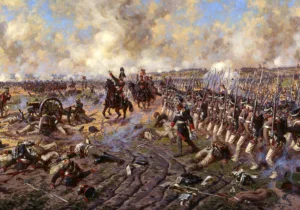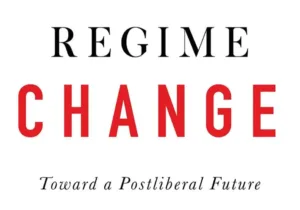A growing chorus of people blames individualism for many of America’s social ills. From increasing social isolation, to decreasing trust in institutions, to rising rates of suicides and drug overdoses, an ideology that prizes individual autonym and leads to so-called “atomization” is to blame. Without an emphasis on culture and customs that encourage stable families, strong work ethics, and participation in faith traditions, many of our country’s most worrying trend lines will only get worse. If politics focuses on the individual, so the thinking goes, then social areas of life—which serve as mediating structures between the individual and the state—will be further enervated. The twenty-first century will be a miserable, not an American, century.
Those who reach this diagnosis often argue the state must clamp down on individualism, which may require a stronger central government. While the latter proposition opens up a worthwhile debate about the state’s proper role in a free society, concluding individualism is categorically pernicious would be wrong. Individuals, social institutions, and the state all have value. Indeed, human happiness, social progress, and even national greatness require individualism.
Arguments on both sides of this debate often use the word “individualism” as a catchall for either their favored or disfavored positions. As in many debates about “-isms,” a clear definition is beneficial, and John Stuart Mill’s On Liberty provides a useful starting point.
Chapter 2, the most cited section and the one favored by those concerned by groupthink at universities, argues each person should be free to form and express opinions. Mill contends, “If all mankind minus one were of one opinion, and only one person were of the contrary opinion, mankind would be no more justified in silencing that one person, than he, if he had the power, would be justified in silencing mankind.”
Mill continues his case in the third chapter and says that not only should individuals be free to think and express new ideas, but they should also be free to do something about those ideas. He argues people ought to be “free to act upon their opinions—to carry these out in their lives, without hindrance, either physical or moral, from their fellow men, so long as it is at their own risk and peril.”
Individualism properly understood then holds that human beings ought to be able to think, express, and act in original ways—even if doing so makes the majority uncomfortable. These three notions form a useful working definition of individualism.
Unlike opinions, though, not all individual actions should be permissible. Other individuals, social groups, or the state may control actions that cause unjustifiable harm. Individuals temper their actions through what Mill calls “unfavorable sentiments”—expressed through reflection or public shame. Such crucial checks should limit individualism’s dangers.
But anti-individualists find these checks insufficient. If a prescribed action, particular way of life, or idea of the common good is satisfactory for a majority—or even a vocal minority—why should it not be good enough for everyone else? This view may be based on complacency, nostalgia combined with lack of imagination, or the fear that, although a better future may be achievable, the pursuit could cause great harm. Rather than pursue progress, it might be better to stifle originality and focus on cultural inheritance.
Worries about the potential negative effects of deviating from established customs are serious. People should be good descendants and not squander their cultural inheritance. As Mill states, “It would be absurd to pretend that people ought to live as if nothing whatever had been known in the world before they came to it.”
But people should also think about what comes after them. That means being good ancestors. People should not only conserve, but also reform prudently. Individuals ought to question and understand the world, and, after coming to a thorough understanding, either accept or improve it. After all, the ideas that brought humanity to the present—both good and bad—were not thought up by states or social institutions. Individuals—sometimes even radicals—had original thoughts and then took action. Those actions were sometimes constructive and sometimes destructive.
Individualism’s detractors should be less interested in stifling different ideas, and more interested in channeling them toward virtue rather than vice. Social institutions often play that important mediating role—particularly in the realm of education—and they temper the destructive possibilities of radical individualism. Governments meanwhile are necessary to secure rights like life, liberty, and the pursuit of happiness.
However, social institutions cannot act independently or sustain themselves. Individuals do such work, and broader organizations gain importance and relevance in large part because individual people understand their functions, commit to their purposes, and strengthen them. This is true of churches, scouting groups, bowling leagues, and any number of groups wherein people gather for a common purpose. It is what made Socrates stay in his city-state of Athens to face his death sentence even when his friend gave him the chance to escape.
Athens was the cradle of Western civilization because of individuals like Socrates who understood the power of one person with a new idea that bucked the norm. Were social or state institutions to supplant the individual entirely—as the mob in Athens attempted—they would take happiness, loyalty, and greatness out of those institutions. They would also deny an essential element of what makes people human beings.
In nineteenth-century China, Mill saw a warning of what can happen when a society stops valuing individualism. According to Mill, China was a great nation that inherited great customs. But Chinese traditions also discouraged the Chinese from being creative, prizing conformity over innovative thinking. While Europeans competed against one another in new ways—sometimes with technologies earlier Chinese invented—China rested on its laurels. This opened the door for Western powers—including a relatively young United States—to exploit the ancient Middle Kingdom.
Many who decry individualism today yearn for an American nation as cohesive and optimistic—if not as imperialistic—as a supposed golden age. But if America’s social fabric is to be woven together, free individuals who understand our history, have new ideas about our future, and possess courage to act will make the union more perfect.






 Sponsor a student for Christianity & National Security 2024
Sponsor a student for Christianity & National Security 2024